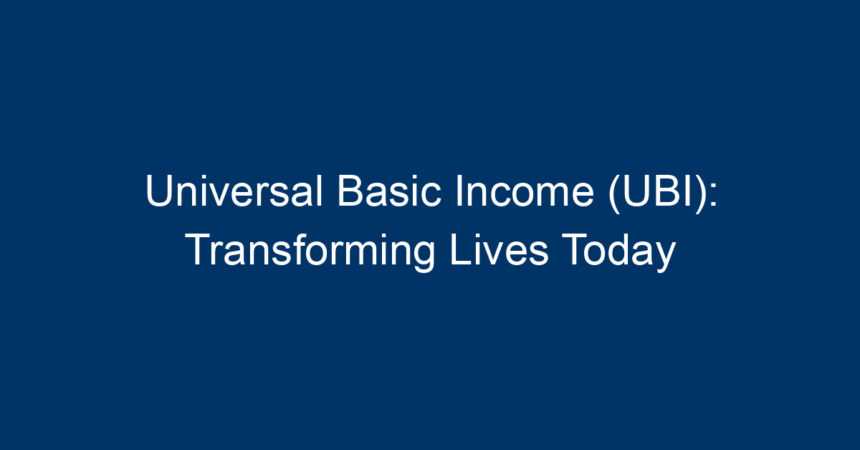In an era defined by economic uncertainty and technological advancement, the concept of Universal Basic Income (UBI) is gaining momentum and sparking debate worldwide. The idea is simple yet profound: providing all citizens with a regular, unconditional sum of money, irrespective of their income or employment status. This article will delve into the transformative potential of UBI, its benefits, and the challenges it faces.
Understanding Universal Basic Income (UBI)
What is UBI?
Universal Basic Income (UBI) is a financial program designed to provide every individual with a fixed amount of money, usually on a monthly basis. Unlike traditional welfare programs, UBI is not contingent on income, employment, or other eligibility requirements. This means everyone benefits, helping to alleviate poverty and reduce income inequality.
Historical Context
The roots of UBI can be traced back to various ideologies and experiments throughout history. While the concept gained traction during the 20th century — endorsed by notable figures such as Martin Luther King Jr. and Milton Friedman — it has taken center stage only recently. Countries like Finland, Canada, and even parts of the United States have conducted pilot programs to test its feasibility.
How UBI Works
Unconditional Payments
One of the most appealing features of UBI is its unconditional nature. Recipients receive the payment simply for being citizens, allowing them to use the funds as they see fit. This flexibility empowers individuals and strengthens their financial independence.
Funding UBI: Possibilities and Considerations
Funding a UBI program is a crucial consideration for policymakers. Different models propose various methods, including:
- Taxation: Implementing a progressive tax system that places a heavier burden on the wealthy can provide substantial revenue for UBI.
- Elimination of Welfare Programs: Some argue that UBI could replace existing welfare programs, streamlining government spending.
- Dividends from Natural Resources: Utilizing income from resources, like oil, can be a sustainable funding source.
The Benefits of Universal Basic Income (UBI)
Economic Stability
One of the primary advantages of UBI is its potential to create economic stability. By providing a safety net, individuals are less likely to fall into poverty during difficult times, such as job loss or health crises. This financial cushion can lead to greater spending and stimulate economic growth, benefiting local businesses.
Empowering Individuals
UBI promotes personal freedom by providing individuals the means to make life choices without the constant burden of financial insecurity. Many beneficiaries use their UBI payments to pursue education, start businesses, or care for family members, which can ultimately enrich communities.
Reducing Income Inequality
Universal Basic Income (UBI) has been lauded for its ability to combat income inequality. In an age where the wealth gap is widening, UBI can redistribute income more equitably, ensuring that everyone has access to basic needs.
Facilitating Workforce Transition
With automation and AI continuously reshaping job landscapes, UBI serves as a buffer for those displaced by technological advancements. It can provide necessary support for individuals transitioning into new career fields, thereby fostering a more adaptable workforce.
Real-World Examples and Pilot Programs
Finland’s Experiment
In 2017, Finland launched a two-year pilot program that provided 2,000 unemployed individuals with a monthly payment of €560. The results showed increased well-being among recipients, although the program did not significantly boost employment rates.
The U.S. Initiatives
Various U.S. cities, like Stockton, California, have introduced UBI trials. Stockton’s program provided $500 monthly to low-income residents for two years. The outcomes indicated improved financial stability, mental health, and job-seeking behavior among participants.
Other Global Examples
Countries like Spain and Kenya have also begun exploring UBI schemes. These real-world examples provide valuable insights into the practical implications and impacts of universal basic income.
Challenges Facing Universal Basic Income (UBI)
Public Perception and Political Will
Despite its potential benefits, UBI faces skepticism from some policymakers and the public. Concerns over funding, potential disincentives to work, and the perceived fairness of unconditional payments pose challenges that need to be addressed through public education and advocacy.
Economic Viability
Critics often argue that the implementation of UBI could lead to inflation or increased taxes. Policymakers must carefully consider economic models and funding mechanisms to ensure the program’s sustainability without overly burdening taxpayers.
The Balance of Work Incentives
While UBI aims to provide financial security, concerns about work disincentives remain. Advocates often counter that UBI empowers individuals rather than discouraging them from participating in the workforce. The key lies in finding the right balance—ensuring that while basic needs are met, people are still motivated to contribute to society.
The Future of UBI: Moving Forward
Encouraging Policy Development
As the conversation around universal basic income (UBI) continues to evolve, it is essential for policymakers to collaborate with economists, social scientists, and the community. Crafting well-informed policies based on pilot program outcomes can help create effective and sustainable UBI models.
Advocating for Public Awareness
Public perception plays a crucial role in the implementation of UBI. Awareness campaigns that highlight the successes and potential of UBI can shift mindsets and garner wider support among citizens and lawmakers.
Scalable Solutions
To address concerns surrounding UBI, scalable solutions can be explored. Starting with targeted UBI for specific populations, such as those affected by automation, may provide a manageable entry point before broader implementation.
Conclusion: Actionable Insights
Universal Basic Income (UBI) has the potential to transform lives by alleviating poverty, reducing income inequality, and empowering individuals. As more countries and cities experiment with UBI, the need for informed discussion, advocacy, and policy development becomes increasingly critical.
Get Involved
- Educate Yourself: Stay informed on UBI initiatives and pilot programs in your area.
- Engage in Community Discussions: Participate in local forums or discussions about UBI to raise awareness and share knowledge.
- Advocate for Change: Support organizations and legislation that promote UBI and financial equity.
Embracing Universal Basic Income (UBI) is not just an economic strategy; it is a step towards redefining social welfare in the 21st century. Together, we can mold a future where basic needs are met for all, allowing for a flourishing society built on equity and dignity.




